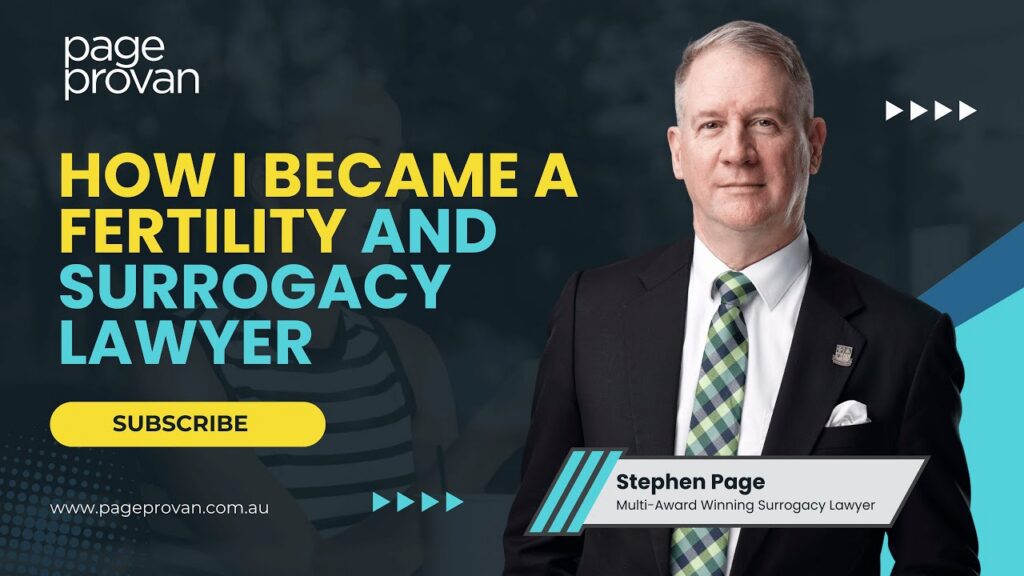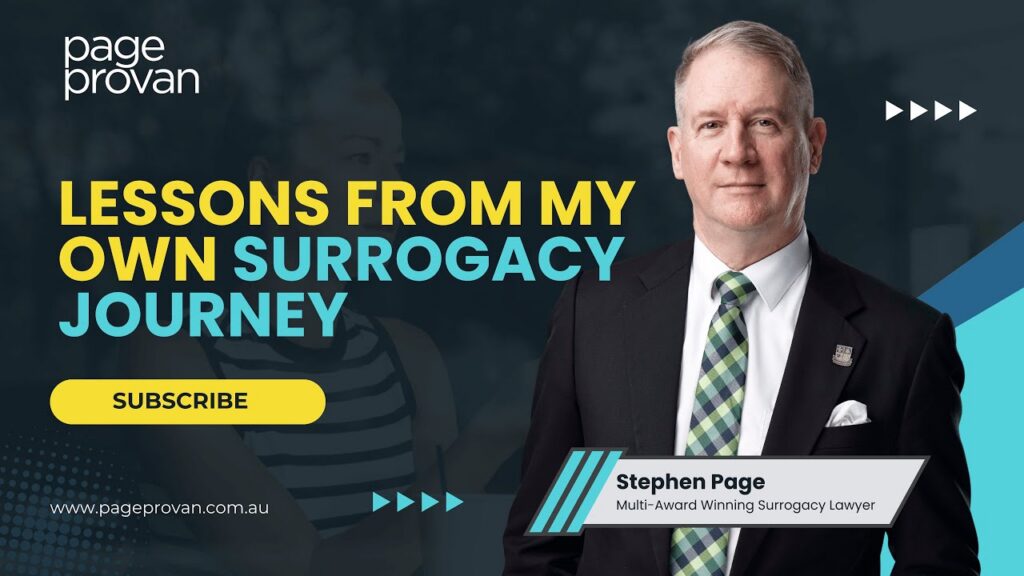QLD Proposed Reforms with a Central Registry
In this video, award-winning fertility lawyer and Page Provan director, Stephen Page, talks about the Queensland proposed reforms with a Central Registry.
Transcript
G’day, I’m Stephen Page from Page Provan Family and Fertility Lawyers, and I’m talking today about the proposed changes in Queensland.
Last year, 2022, the then Attorney General, Shannon Fentiman, announced that she was seeking that there be an inquiry by a parliamentary committee about there being a central registry in Queensland and about retrospective transparency of gamete donors in Queensland. Now, I sound like I’m speaking double Dutch.
A central registry is where instead of each individual IVF clinic keeping a registry of who has been a sperm, egg or embryo donor, that this is kept by the state government, and the Parliament agreed that there should be a parliamentary inquiry, and the parliamentary inquiry was then held. I put in a written submission and gave evidence to the committee.
My view was that the idea of central registry was a good one. If you’re a donor conceived adult and you want to find out where you came from because your parents haven’t told you, or they may not know because you might have a donor they don’t know, it might be a clinically recruited donor.
Then what you’ve got to do today is bit of a lottery, you’ve got to go to your local IVF clinic and think it’s them and hopefully it’s them, and then you can go through the process of counselling and then identify who the donor is and if the donor wants to have contact.
But of course, it’s a lottery as to whether that’s actually the clinic you went to or your parents went to, however many years ago, 20, 30 years ago. So the idea that there’d be a central registry makes a lot more sense that, well, whichever clinic in Queensland that they might have gone to, you can go to one run by the state government and find out, I think that’s marvellous.
Of course, there’s a limitation with all of that, and that is, well, it only applies in Queensland. The other big issue that was identified in this process was, what do you do about those blokes? It was primarily blokes who donated their sperm all those years ago when they were told by the clinics, it’s secret squirrel business, we can’t ever tell that you are a donor, don’t worry about it, it’s all secret, and for the parents, they were told by the clinics, don’t ever tell your child.
Well, that was just wrong, that was just wrong. Everyone has the right to know where they’ve come from, and what we’ve seen are donor conceived adults in Australia who are lied to by their parents, they don’t know who the donors were, and they want to find out, and if you want to have a painful conversation in your life, listen to one of these people.
Now, not every donor conceived adult has a burning desire to find out where they’ve come from, but some do, and for those who are on that journey, it’s important that they find out. Some years ago, the head of the Family court at the time, Chief Justice John Pascoe, said there was a human right, a basic human right for everyone to know where they’ve come from and I think that’s right.
So that was one of the things I said to the committee as part of the inquiry process, and I also said, well, if you’re going to be running this, it should be run by the registrar Births, Deaths and Marriages in Queensland, and not by the health department.
Nothing against the health department, it’s just that’s the model that’s used in New South Wales, it’s the health department that runs it. It’s just that Births, Deaths and Marriages, in Queensland, do us proud.
They’re the most efficient in the country, they knock over, for example, parentage order applications once the orders have been made to update the parent’s details in something like three hours to two business days, as opposed to New South Wales, which typically takes six weeks, and in one case recently, for clients of mine, took five months.
Why it took five months, I don’t know, and they’re remarkably efficient, very friendly to deal with, just great, great. So we got the report back from the Parliamentary Inquiry, and it said, Guess what? There should be a central registry.
There should be retrospective transparency, and most of the submissions about donors was that there should be retrospective transparency, and of course, it’s naturally a controversial area.
But I think on balance, it’s the right decision, and this affects donations that occurred pre 2004 through IVF clinics. It doesn’t affect known donors for obvious reasons, those not going through clinics and post 2004.
There is a regime set up through the Fertility Society of Australia and New Zealand, the National Health and Medical Research Council, that there’s required consent by the donor that after the child turns 18, the child can, if they want, to find out where they came from, and it’s their power, it’s no one else’s power.
So it’s those pre 2004 cases. What we also know about those pre 2004 cases is that, well, doctors in the initial days didn’t comply with any caps, thankfully. For about the last 20 years, they’ve done so, and there have been quite firm caps on a number of donors, and often didn’t keep records. So the idea that there will be records may not be true.
There may be donor conceived adults who forever will not be able to accept through doing DNA tests and similar actions, be able to find out where they came from. Another issue that I was certainly concerned about was, well, if you set up a Queensland Central Registry, that’s not the ideal, and I and others said the ideal would be to have a national central registry, but there seems to be no appetite by the feds for that to occur.
So in the absence of a national registry, can we just have a one button search all, just like we do with Google? And I hope that happens. I hope that if a donor conceived adult goes to, for example, the Queensland Central Registry and does a search, that it in turn automatically does searches of the other central registries, which currently are New South Wales, Victoria, South Australia, and hopefully, if they get their act together, Western Australia.
Pretty well most of the country and it looks like there’s going to be a central registry in the ACT as well. So the only places that won’t have one, are of the smallest jurisdictions, Tasmania and Northern Territory. Why it’s important to have this national approach is because people move around.
You shouldn’t assume that the IVF clinic was necessarily in Queensland, it might be in a state. After that report came back, it went to the government. The government agreed in principle with all the recommendations of the report, which is marvellous. Certainly, I have spoken to Peter Russo, the MP who chaired the committee.
He’s certainly very keen for there to be laws in place. These laws in Queensland are something entirely new, so one would think it will take a while to get through the drafting process before it gets to cabinet and then to Parliament, and we’ve had a slowdown.
The slowdown has been that there has been a swap between Ministers, Yvette D’Ath was the Attorney General before Shannon Fentiman and Yvette D’Ath went to Health, and then Shannon Fentiman was appointed as the Attorney. There’s recently been a reshuffle, so Yvette D’Ath has now become the Attorney General again, and Shannon Fentiman has become the Health Minister.
So I expect that there will be a delay as a result of that ministerial reshuffle in the process. But I’m confident that Queensland will have a central registry and that it will have retrospective transparency and that this will be through the central registry, will be run through the Register of Birth, Deaths and Marriages.
I hope that there is that one-stop shop approach. No one else has done it, but I hope Queensland leads the way in ensuring that happens.
Thank you.












